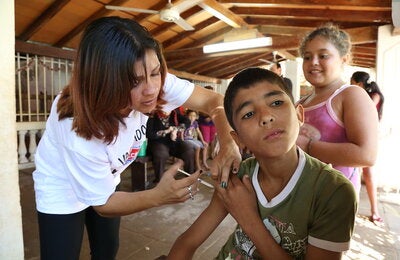With a view to seeking greater political commitment on critical health issues and inspire participation at the highest level of authority of governments for the upcoming United Nations High-level Meetings (UNHLM) on Noncommunicable Diseases (NCDs) and on Tuberculosis (TB), the Permanent Mission of Jamaica to the United Nations, together with a team of experts from the Pan American Health Organization, briefed the representatives of country missions to the United Nations (UN) on intersectoral interventions that can reduce the burden of NCDs and of TB.
With a view to seeking greater political commitment on critical health issues and inspire participation at the highest level of authority of governments for the upcoming United Nations High-level Meetings (UNHLM) on Noncommunicable Diseases (NCDs) and on Tuberculosis (TB), the Permanent Mission of Jamaica to the United Nations, together with a team of experts from the Pan American Health Organization, briefed the representatives of country missions to the United Nations (UN) on intersectoral interventions that can reduce the burden of NCDs and of TB.
The session was chaired by the Permanent Representative of Jamaica to the UN, H.E. Mr. Courtenay Rattray, and included the co-facilitators of the UNHLM on NCDs, the Permanent Representative of Uruguay to the UN, H.E. Mr. Elbio Rosselli and the Permanent Reprentative of Italy to the UN, H.E. Mr. Sebastiano Cardi, as well as the co-facilitators of the UNHLM on TB, the Permanent Representative of Antigua and Barbuda to the UN, H.E. Dr. Aubrey Webson, and the Permanent Representative of Japan to the UN, H.E. Mr. Koro Bessho. Representatives from 25 Member States of the 35 members of the Pan American Health Organization were actively engaged throughout the three hour session, which reviewed the burden and impact of these health matters and the proposed multi-sectoral responses needed to improve population health.
The Permanent Missions to the UN play a critical role in achieving high impact global political commitments to improve health and well-being for sustainable development. This September 26 and 27, at the United Nations, world leaders will meet to discuss NCDs and TB , two critical health issues which are hampering social and economic development around the world.
Strong political support is needed to achieve the necessary scale-up of global efforts to prevent and control NCDs and promote mental health and well-being, prevent avoidable deaths, extend and improve lives and end tuberculosis, a leading infectious killer in the world.
Despite the evidence-based policy interventions and medical tools available to prevent and control NCDs, and TB, implementation and funding for NCD and TB initiatives remain limited. An effective NCD and TB response requires robust health systems and rapid progress towards universal health coverage, so that everyone at risk or affected by these conditions can have access to quality prevention, treatment, rehabilitation and palliative care services.
World leaders have recognized the urgency and importance of addressing these two epidemics in the Sustainable Development Goals, and the High-level meetings will provide a unique opportunity to redouble efforts for a stronger multisector response to these health issues.
NCDs and TB in the Region of the Americas
Every year, 5.2 million people die from non-communicable diseases (NCDs) in the Americas, primarily from diabetes, cardiovascular diseases, cancers, and chronic respiratory diseases, with 35 percent of these deaths occurring prematurely in people between 30 and 70 years of age. At the same time approximately 20,000 people die from Tuberculosis (TB) each year and more than one quarter of a million people are affected by this disease in the Americas. NCDs and TB also share several underlying social determinants: there is a strong association with poverty, living and working conditions, and financial and social protection.
There is also a direct relationship between specific NCDs and TB and mental health disorders, namely addictions. The burden of these epidemics, their disproportionate impact on the poor and populations living in vulnerable conditions, and the high costs associated with care are having an adverse impact on individuals, families and economies. Previous global commitments on NCDs have been made, yet progress has been insufficient to meet the target of reducing premature NCD mortality by one'third by 2030. Therefore, this third UN HLM on NCDs will be perhaps the last global opportunity to reinvigorate political commitments, and set clear priorities and plans to overcome the obstacles faced to establish public policies to reduce risk factors and strengthen health services to improve care and treatment. For TB, this will be the first UNHLM of its kind, which is expected to rally the global community around the elimination targets for TB.
Video
Dr. Carissa Etienne message to Permanent Representatives to the UN from PAHO Member States



